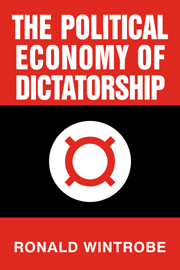Book contents
- Frontmatter
- Contents
- Dedication
- Acknowledgments
- Part I Introduction
- Part II Equilibrium political repression
- Part III Economics of autocracy
- 6 The economy of dictatorship
- 7 Redistribution and rent-seeking
- 8 Apartheid
- 9 The bureaucratic economy I: the model
- 10 The bureaucratic economy II: rise and fall
- Part IV The dynamics of dictatorship
- Part V Conclusion
- References
- Name index
- Subject index
6 - The economy of dictatorship
Published online by Cambridge University Press: 05 June 2012
- Frontmatter
- Contents
- Dedication
- Acknowledgments
- Part I Introduction
- Part II Equilibrium political repression
- Part III Economics of autocracy
- 6 The economy of dictatorship
- 7 Redistribution and rent-seeking
- 8 Apartheid
- 9 The bureaucratic economy I: the model
- 10 The bureaucratic economy II: rise and fall
- Part IV The dynamics of dictatorship
- Part V Conclusion
- References
- Name index
- Subject index
Summary
Introduction
A specter haunts democracy. Many – if not most – of the citizens of democratic countries put great value on liberty and the capacity to develop as individuals, both of which are the hallmarks of democracy. However, these freedoms have a price, one that arises from the fact that when individuals are free to develop in different ways, they will tend to take different paths. Moreover, in open societies characterized by freedom of association, individuals are free to join or form into groups, groups are free to practice and to advocate their own beliefs, and the result is what often appears to be a cacophony of different values, lifestyles, beliefs, and practices. On any given day in the United States, for example, the individual picking up a newspaper or watching television may be confronted with the views of right-to-lifers, the Christian Coalition, gun control advocates, prostitutes' associations, lesbians for Christ, advocates for the disempowered, corporate advertising of every description, advocates for the legalization of drugs, crusaders against McDonald's, people who want to fight pornography on the internet, people who think television sitcoms are a threat to family values, and so on.
Now, there are many who revel in this diversity, but for others the flourishing of alternative lifestyles and points of view that are antithetical to their own brings only discomfort. But this is not the problem which concerns us here.
- Type
- Chapter
- Information
- The Political Economy of Dictatorship , pp. 127 - 144Publisher: Cambridge University PressPrint publication year: 1998

